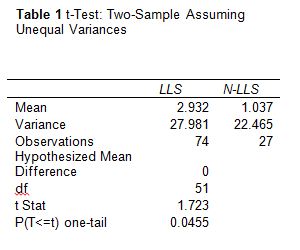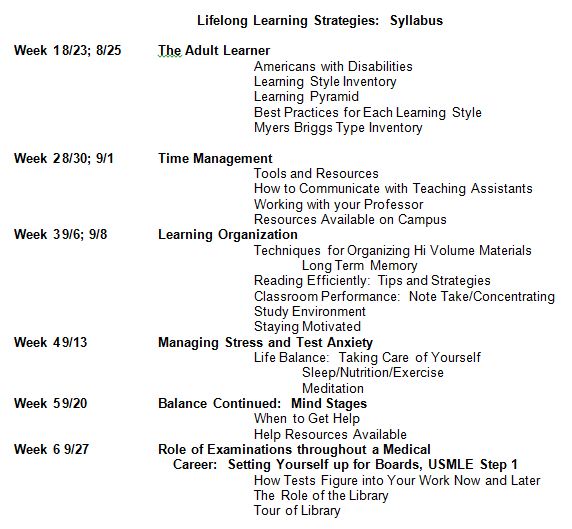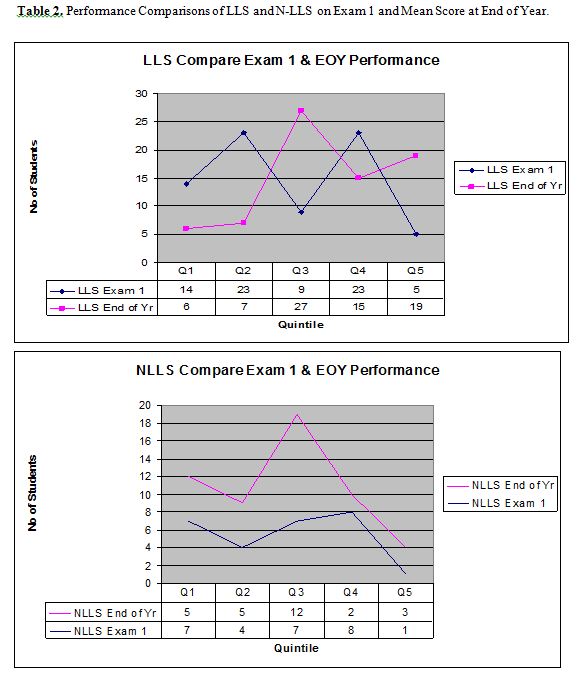ABSTRACT
Despite the greatest efforts of our Admissions Committee, every year students are admitted to medical school who, despite their excellent applications, start medical school and perform poorly when faced with the rigors of the first year (M-1) curriculum. As the pace of medical school studies ramps up with the unfolding semester, some of these students develop serious academic deficits. At the University of Illinois at Urbana-Champaign, faculty have questioned the student understanding of their personal learning systems and have found many students have not developed learning strategies that lead to efficient and effective learning.
The goal of this study was to apply statistical analysis to M-1 student performance data for one academic year to determine the impact of the Lifelong Learning Strategies course on M-1 students who had performed poorly on the initial examination.
Students were enrolled in a 6-week course and their performance during their M-1 years was compared to those who were not enrolled in the course. Analysis of the change in performance included t-Test comparisons of group performance.
The Lifelong Learning Strategies course appears to have a positive impact on student academic performance.
INTRODUCTION
The purpose of medical education is to prepare competent and confident physicians. With rapid advances in medical research and the ever-burgeoning body of literature it generates, the requirement for effective continuing medical education is already in place before a license to practice is issued. The outsized demands of acquiring, organizing, assimilating, and integrating relevant information into applicable knowledge indicates that the success of a medical practitioner depends in no small part on his or her mastery of personal lifelong learning strategies. Medicine is a profession in which information overload must be considered an occupational hazard, and that hazard begins abruptly in the first year of medical school. Every individual’s learning style is highly personal, and is shaped by a unique combination of perceptual and cognitive factors. There is no reason to believe that students can, without training, intuitively grasp and apply effective learning strategies toward that end; however, this is precisely what traditional medical education tends to demand of them. As first-year (M-1) medical students struggle to discover how to cope with unprecedented educational demands, their academic performance may suffer. Such performance problems are usually compounded by high levels of accompanying stress. Furthermore, even students with learning strategies that were effective in secondary school and undergraduate coursework often experience excessive levels of stress from the typical first-year medical curriculum1.1-5 Several studies document how that stress increases throughout the year1.6-9 When students matriculate they are in need of guidance to successfully navigate the new educational demands placed on them by the stresses of training and future career.
In order to address the issues summarized above, the College of Medicine at the University of Illinois at Urbana-Champaign (UIUC) in August 2006 offered its inaugural Lifelong Learning Strategies (LLS) class — a short course developed to help first-year medical (M-1) students quickly discover and optimize their own individual learning strategies, including lifestyle choices, to help them reduce stress and its related impact on academic performance.
MATERIALS AND METHODS
In order to address the issues summarized above, the College of Medicine at the University of Illinois at Urbana-Champaign (UIUC) in August 2006 offered its inaugural Lifelong Learning Strategies (LLS) class — a short course developed to help first-year medical (M-1) students quickly discover and optimize their own individual learning strategies, including lifestyle choices, to help them reduce stress and its related impact on academic performance.
The LLS course was developed as a treatment for a group (i.e., M-1 students) at elevated risk of poor academic performance related to coursework demands, information overload, and associated stress. LLS addresses four major themes of lifelong learning in the medical environment:
•adult learning
•time management
•organizing techniques
•personal balance
During orientation week, August 15-18, 2006, new M-1 students matriculating to the Urbana, Illinois, campus were given a brief description of the LLS course and invited to enroll at that time. Students were informed that this was their one opportunity to enroll in LLS, and that attendance was expected for every class session regardless what other conflicts or issues might arise. The first session was held during the first week of M-1 coursework.
The course was designed to present fundamental guidance in lifelong learning strategies along with access to a considerable amount of supplementary information for self-guided skills development. The core information was presented in 9 forty-minute sessions, twice a week for six weeks, then once per week for the last three weeks, during August and September 2006. Using a framework based on the four lifelong learning themes, previously noted, College of Medicine faculty and guest experts led the classroom sessions. In addition to this baseline course content, students were given a printed booklet, the “Lifelong Learning Strategies Guidebook,” to reinforce and expand upon material covered in the classroom sessions; and access to a dedicated LLS web page hosting related research papers, external links, and other self-development instruments. (It should be noted that the College of Medicine provided the entire M-1 student body access to the LLS web page, not just those participating in the course.)
The first priority of the course was to help students identify their personal learning process- whether visual, auditory, kinesthetic, or a hybrid style. The broader objective of the first three weeks was to help students learn how to successfully apply their individual learning style using proven time management and organization skills in preparation for the first examination. This examination is a two-day series of tests, administered to all M-1 students, covering the six basic science topics comprising the M-1 curriculum. Scores on the first exam count toward the student’s class rank, but the main purpose is to acquaint new students with the style, depth, and breadth of test questions in the M-1 curriculum and how they relate to the learning material. The LLS lessons covered strategies on how to manage time and effort with respect to the specific subject as well as its relative weight toward class rank on the first exam. After the first exam was completed, the remaining LLS sessions focused on the role of stress management, health, and personal balance in the life of medical students and the career physician. The Lifelong Learning Strategies (LLS) course deals with key topics for first-year medical students.
The Adult Learner addresses issues regarding individual learning styles, the best practices for learning within each style as well as issues related to accommodation as it is related to learning disabilities. The learning styles component presents three commonly used learning styles and various instruments used in determining them. The course primarily explores the Visual/Auditory/Kinesthetic (VAC) System, but also introduces Kolb’s Learning Inventory and Howard Gardner’s Multiple Intelligences. After identifying their individual learning styles, students are then presented techniques that directly and efficiently support their particular style.
Time Management introduces a variety of time management tools and resources, and provides tutorial activities to help familiarize the students with those tools. Students also learn how to work efficiently with teaching assistants, how to interact with professors, and the types of supportive resources available within the structure of the campus. These include resources found at the Counseling Center which include psychological counseling, study skills coaching, and testing for learning disabilities.
Learning Organization assists students in the techniques of organizing high volumes of materials and assimilating them into long-term memory. Emphasis is directed at efficient reading, note-taking, classroom behavior, the study environment, and motivation.
Managing Stress and Test Anxiety addresses life balance, understanding cues in their own behavior that may indicate they should seek assistance, introduction to meditation, and support resources.
The Role of Examinations throughout a Medical Career introduces testing issues encountered by undergraduate medical students, residents, and practicing physicians. Emphasis is placed on preparation for The United States Medical Licensing Examination (USMLE) Steps 1 and 2, as well as subject examination preparation.
The syllabus for the inaugural six-week LLS course, August – September 2006, is shown below. The course was taught over six weeks, during the first three weeks there were two meetings per week and during the second three weeks, the class met one time per week. Presentations lasted approximately forty to forty-five minutes, giving students the time to get food or go to their locker after morning classes.
There were no class assignments. Students were asked to attend class and were given a book of materials that supplemented the topics presented in class. They were also referred to the web page that contained additional links to on-line instruments and additional materials. The idea behind this step-wise presentation of material was to supply those who were particularly interested in a certain topic with resources, but not to inundate busy students with materials that had only a superficial interest level.
The subjects of this study were drawn from an eligible group of 101 traditional-track, full-time M-1 students who matriculated to the Urbana campus of the University of Illinois in August 2006. Students excluded from this study were those not on a traditional track, namely repeating students, those who upon failing a course or learning component within the curriculum, must re-take the entire year’s curriculum; students enrolled in the Decompressed Program, students who spread the first year courses over two Academic Years; and, students participating in the Medical Scholars Program, students who pursue both the MD and PhD degrees. As indicated previously, initial performance data were acquired at week 3 of the first semester, when the first exam was administered. The subjects of our analysis were those eligible M-1 students who performed in the bottom forty percent of the class on the first examination. These subjects were divided into two groups: those who had enrolled in the LLS course (LLS, n=74) and a control group consisting of those who did not enroll (N-LLS, n=27.) The Institutional Review Board (IRB) approved a study to analyze performance changes in both groups, as based on class rank after the first exam versus class rank at the end of the academic year.
Performance comparisons of the study and control groups were based on a “Change” metric, defined as the difference in mean performance by each group over time. The Change variable is calculated by subtracting the student’s score on the first examination from his or her score on the end-of-the-year examination. Subtraction of the score on the first examination in effect establishes an equivalent performance baseline for all students and thereby focuses on the amount of change rather than absolute scores. Because students made the choice to enroll in the course, establishing this baseline also controls to some extent the self-selection bias among the subjects that is inherent in studies of this type. A sample t-Test, assuming unequal variance, was performed to compare the two groups using Microsoft Excel, with the results being confirmed using SAS.
RESULTS AND DISCUSSION
When assuming unequal variances in the distribution, there was a significant difference in the Change variable, P = 0.05 for a one-sided test. A one-sided test is appropriate because we are testing the hypothesis that taking the LLS course is beneficial. The result indicates that students enrolled in the LLS course achieved a significantly greater average increase in performance than the control group by the end of the year (Table 1). Observations regarding student performance are shown in Table 2. Of particular interest were the findings where 50% of the LLS students began the year at the bottom 40% of the class and improved their scores, with some of those students even moving into the top 20% of the class by the end of the first year. The opposite trend was noted on those who did not take the course, with 33% of those students moving in a downward (lower performance) direction.

Of all students who enrolled in the LLS course, only 16% were in the bottom performance quintile at the end of the fall semester. When comparing the top of the class performance (student performance in the top 20% at the end of the year), 74% of those students enrolled in the LLS during the Fall.

The LLS course was received enthusiastically by the M-1 student body. Eighty-three students enrolled in the inaugural course, not including those from the full-time traditional track, those in the Decompressed Program, and those in the Medical Scholars Program (M.D./Ph.D.) Participation throughout the course was sustained at 95%, and those who were unable to attend sought out information in other formats. When the course was completed, all students were given the opportunity to evaluate the course with an on-line evaluation instrument. Students were encouraged to provide specific comments. This evaluation of the course was well attended, with 55% of the class responding to the instrument and including very positive and constructive critiques.
An important incidental interest to the researchers would be a study of the characteristics of students who declined to enroll in the LLS course. Students who re-entered the first year curriculum, who had previously demonstrated serious academic difficulty, such as those who participated in the Decompressed Program (n=3) in the previous academic year (2005–2006) and those students who had to repeat the M-1 year (n=2) and did not elect to enroll in the course. Perhaps the unwillingness to utilize resources offered by the College of Medicine partially contributed to the student academic difficulties. (However, had they chosen to enroll in the course, since their course of study would have been different from those who were ‘first time’ curricular participants, they would have still been excluded from this particular study.) Although the number of students with serious academic difficulties is limited, it would be interesting to see the impact the LLS course would have on their performance as well. In particular, following these students and their performance on board exams, number of attempts on boards, years to graduation, and performance during the clinical curriculum, would be helpful in future advising students with academic problems.

The second year the LLS course was offered, several changes were made, based on recommendations from student and faculty feedback. First, course content, deemed important by the students and faculty, was presented during the Orientation week in August 2007 and was presented to all matriculating first year students. Also, the placement of the LLS course on the calendar was changed. The course was moved to a date after the first examination results were made available to students. This allowed students to first see how they performed on an examination and allowed them to make a more informed decision before committing time to this course. Another improvement in the course was offering the course for elective credit with the stipulation that in order to earn credit students must attend all classes without exception.
CONCLUSION
The results of the statistical analysis indicate that participation in the LLS course had a significant positive impact on student performance during the first year of medical school. LLS students, whose performance on the first examination was poor, significantly improved their scholastic performance by the end of the year, when compared to those who did not take the course.
Based on this research, the authors plan to study the long-term impact of the LLS course on the students and the strategies developed by these students as they continue their training and progress through residency into medical practice. Continuing effort should be made to refine the lifelong learning strategies presented in the course based on both student and faculty input.
Medical schools planning to develop a similar course would be well informed to encourage faculty participation from across several disciplines including education and psychology.
LIST OF ABBREVIATIONS
LLS:Lifelong Learning Strategies (course)
M-1:Medical Student, year one
Q-1:Quintile 1, the lowest performing group on an Examination
Q-5:Quintile 5, the highest performing group on an Examination
ACKNOWLEDGEMENT
With thanks to the following students who contributed to the statistical analysis of this research:
Mrugesh Bhavendra Bavda, Lauren Elizabeth Caskey,
Beverly Gonzalez, and Jianfeng Xu
REFERENCES
- Guthrie, E.A., Black, D., Shaw, C.M., Hamilton, J., Creed, F.H., and Tomenson, B. Embarking upon a medical career: Psychological morbidity in first year medical students. Medical Education. 1995; 29:337-341.
- Dyrbye, L.N., Thomas, M.R., Huntington, J.L., Lawson, K.L., Novotny, P.J., Sloan, J.A., and Shanafelt, T.D. Personal life events and medical student burnout: A multicenter study. Academic Medicine. 2006; 81:374-384.
- Dyrbye, L.N., Thomas, M.R., and Shanafelt, T.D. Systematic review of depression, anxiety, and other indicators of psychological distress among U.S. and Canadian medical students. Academic Medicine. 2006; 81:354-373.
- Yiu, V. Supporting the well-being of medical students. Canadian Medical Association Journal. 2005; 172:889-890.
- Stewart, S.M., Betson, C., Marshall, I., Wong, C.M., Lee, P.W., and Lam, T.H. Stress and vulnerability in medical students. Medical Education. 1995; 29:119-127.
- Tyssen, R., Vaglum, P., Gronvold, N.T., and Ekeberg, O. Suicidal ideation among medical students and young physicians: A nationwide and prospective study of prevalence and predictors. Journal of Affective Disorders. 2001; 64:69-79.
- Parkerson, G.R.,Jr, Broadhead, W.E., and Tse, C.K. The health status and life satisfaction of first-year medical students. Academic Medicine. 1990; 65:586-588.
- Ball, S., and Bax, A. Self-care in medical education: Effectiveness of health-habits interventions for first-year medical students. Academic Medicine. 2002; 77:911-917.
- Vitaliano, P.P., Maiuro, R.D., Russo, J., and Mitchell, E.S. Medical student distress: A longitudinal study. Journal of Nervous and Mental Disease. 1989; 177:70-76.